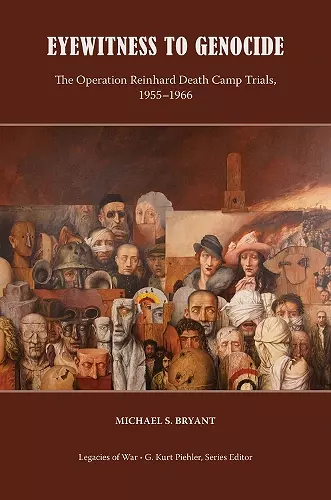Eyewitness to Genocide
The Operation Reinhard Death Camp Trials, 1955-1966
Format:Paperback
Publisher:University of Tennessee Press
Published:30th Jul '16
Currently unavailable, and unfortunately no date known when it will be back

One of the deadliest phases of the Holocaust, the Nazi regime’s “Operation Reinhard” produced three major death camps–Belzec, Treblinka, and Sobibor–which claimed the lives of 1.8 million Jews. In the 1960s, a small measure of justice came for those victims when a score of defendants who had been officers and guards at the camps were convicted of war crimes in West German courts. The conviction rates varied, however. While all but one of fourteen Treblinka defendants were convicted, half of the twelve Sobibor defendants escaped punishment, and only one of eight Belzec defendants was convicted. Also, despite the enormity of the crimes, the sentences were light in many cases, amounting to only a few years in prison.
In this meticulous history of the Operation Reinhard trials, Michael S. Bryant examines a disturbing question: Did compromised jurists engineer acquittals or lenient punishments for proven killers? Drawing on rarely studied archival sources, Bryant concludes that the trial judges acted in good faith within the bounds of West German law. The key to successful prosecutions was eyewitness testimony. At Belzec, the near-total efficiency of the Nazi death machine meant that only one survivor could be found to testify. At Treblinka and Sobibor, however, prisoner revolts had resulted in a number of survivors who could give firsthand accounts of specific atrocities and identify participants. The courts, Bryant finds, treated these witnesses with respect and even made allowances for conflicting testimony. And when handing down sentences, the judges acted in accordance with strict legal definitions of perpetration, complicity, and action under duress.
Yet, despite these findings, Bryant also shows that West German legal culture was hardly blameless during the postwar era. Though ready to convict the mostly working class personnel of the death camps, the Federal Republic followed policies that insulated the judicial elite from accountability for its own role in the Final Solution. While trial records show that the “bias” of West German jurists was neither direct nor personal, the structure of the system ensured that lawyers and judges themselves avoided judgment.
This is a superb book that promises to make a major intervention in a crowded field. Bryant promises to bring together two rather distinct strands of analysis in the literature the political and the legal. To a greater extent than any volume I'm aware of, Bryant brings these two strands together in a coherent and cogent way."" --Devin Pendas, author of The Frankfurt Auschwitz Trial, 1963-1965: Genocide, History, and the Limits of the Law
ISBN: 9781621902621
Dimensions: unknown
Weight: 452g
277 pages